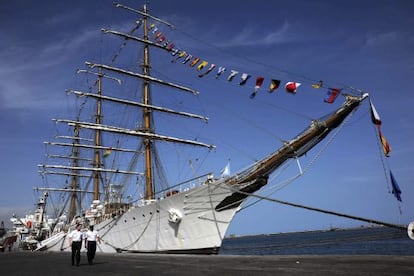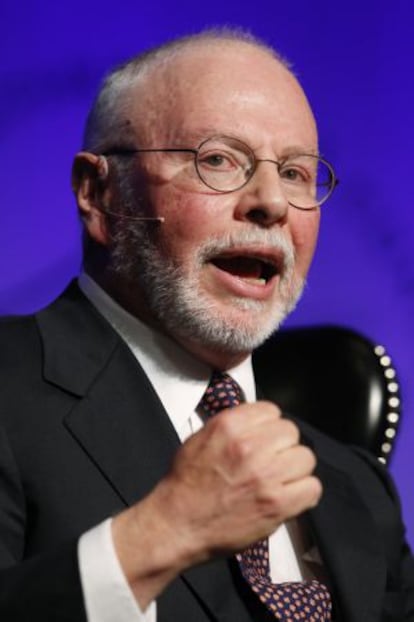Embargoed vessel brews bad blood
Argentina files UN complaint against Ghana for seizing frigate on US court order

The crew of an historic Argentinean navy vessel, impounded by the government of Ghana following an embargo order issued by a US federal court, arrived in Buenos Aires shortly after midnight on Wednesday after they were finally allowed to leave the West African nation.
In all, 281 crew members returned to Argentina on a chartered Air France flight. Forty-five remained in Ghana with the impounded ship.
“We shall return to bring back our ship,” sailor Jorge Moyano told reporters.
Carlos María Allievi, second in command of the ARA Libertad, explained that during the 22 days they spent in Ghana the sailors continued with their “normal” duties.
The Argentinean government has been forced to take this decision after Ghanaian justice put the crew's physical integrity at risK"
“We continued with our daily routine which included training in naval security. There were never any bad moments. We always had what we needed,” Allievi told the Buenos Aires daily La Nación.
The frigate was ordered held after it docked in the Ghanaian port of Tema on October 2 when an Accra court sided in favor of an embargo judgment filed against the Argentinean government in favor of NML Capital, an affiliate of investment firm Elliott Management.
NML is demanding that the Argentinean government pay its shareholders more than $282 million, which it owes them from the massive 2002 debt default. Nevertheless, the investment fund said it would lift the order if Buenos Aires makes a $20-million payment.
An incensed President Cristina Fernández de Kirchner filed her own complaints with the United Nations for what she calls an "illegal seizure" by a foreign government. She also ordered on Monday the evacuation of the ship's crew, with the exception of the captain and about 44 others, after claiming that their human rights were being violated by a Ghanaian judge who prohibited supplying the ship with fuel needed to run the plumbing system. The original crew on the vessel comprised 289 Argentineans, 23 graduate seamen from Chile and Uruguay, and 13 other sailors from Brazil, Paraguay, Venezuela, Ecuador, Bolivia and South Africa.

"The Argentinean government has been forced to take this decision after Ghanaian justice, besides violating international law, has put at risk the crew's physical integrity by denying them supplies for the vessel at dock," reads a statement issued by Fernández de Kirchner's government. Argentina also said that it will file lawsuits in international courts against the Ghanaian government.
On Tuesday, La Nación reported that the Ghanaian government has asked that the vessel be moved from the spot where it is currently docked in Tema because it is affecting Christmas imports that are arriving in the country.
Quoting from a letter by Ports Authority director Margaret Campbell to the Ghanaian judge that ordered the vessel embargoed, the official said that incoming cargo ships, including oil carriers, are bottlenecked at the port. The letter demonstrates the "bad blood" brewing between Accra and Buenos Aires over the Libertad, La Nación says.
In Buenos Aires, there has been major fallout because of the embargo. The Defense Ministry last week replaced navy chief Carlos Alberto Paz and removed two other senior officials as part of a probe into who was responsible for the ill-fated stop in Ghana.
For her part, Fernández de Kirchner has not mentioned the diplomatic spat publicly. However, last week she alluded to the matter when she mentioned that many Argentineans believe that the court cases launched by vulture funds are "attacks against Cristina Fernández de Kirchner or Peronism."
"They are not; they are attacks against the Republic of Argentina -- against 40 million Argentineans," she said.
The man behind Elliot Capital Management is the US citizen Paul Singer, an advisor to Republic presidential candidate Mitt Romney, and who specializes in purchasing debt from nations such as Peru and Congo. A big donor to the Republican campaign, Singer has also been active in liberal causes, such as same-sex marriage. He has donated some $12 million to campaigns in favor of homosexual marriage in the United States, influenced by his son who married his male partner in 2012.
For some time, Singer has been a headache for the Argentinean Foreign Ministry. When Fernández de Kirchner visits the United States, Singer reportedly channels funds toward the organization of protests against her government. He has gone to great lengths to make the Fernández de Kirchner government feel uncomfortable. Between 2007 and 2010, Argentina had to change flight plans of the presidential plane Tango 01 to the United States and Germany for fear that it would be embargoed.
After the Argentinean government found out that Singer was successful in getting the boat seized, the Foreign Ministry issued a statement charging that Singer was operating NML from the Cayman Islands. Singer was responsible for having a large stuffed rat placed outside Argentina's Embassy in Washington on the country's day of independence, the ministry charged.
Still no YPF investors six months after takeover
It has been a little more than six months since Argentinean President Cristina Fernández de Kirchner announced that her government would expropriate the 51-percent share that Spanish oil giant Repsol held in YPF. Since then, YPF's stock has plummeted on Wall Street; shares are not worth half of what they were valued when the Argentinean Congress approved the takeover.
According to Repsol officials, the main reason for the government's seizure had to do with the so-called Vaca Muerta oil fields. The move came just months after YPF announced the large oil find under a rocky formation stretching across Neuquén and Mendoza provinces.
Repsol officials estimated Vaca Muerta could yield as much as four billion barrels of crude and help Argentina meet its energy supplies for many years to come. But now, YPF cannot find any multinationals to invest in Vaca Muerta as Repsol had pledged to do.
According to the law passed in Buenos Aires, the Fernández de Kirchner government had six months to square things away on friendly terms with the Spanish oil giant. This time period began on May 10 when Repsol sent a letter in protest at the expropriation. Since then Repsol officials have tried fruitlessly to meet with Argentinean Treasury officials.
But earlier this month, Argentina's Solicitor General Angelina M. E. Arbona sent a letter to Repsol protesting the company's decision to take the controversy before the Organisation for Economic Co-Operation and Development (OECD).
"Under these circumstances we must postpone trying to maintain friendly consultations until the Kingdom of Spain and the European Union cease lodging their international complaints with respect to the differences regarding YPF," she wrote. "The letter demonstrates Argentina's bad faith over holding talks with us. Since October we have been asking to meet with them," a Repsol lawyer responded.
The government needs at least an annual investment of $7.4 billion to exploit the oil fields at Vaca Muerta from next year until 2017, according to a plan presented to the new YPF director Miguel Galuccio. Daniel Montamat, who served as president of YPF from 1987 to 1989 and as former secretary for energy, said foreign investors have not been interested in Vaca Muerta because they are concerned about the country's strict controls on the repatriation of capital.
Tu suscripción se está usando en otro dispositivo
¿Quieres añadir otro usuario a tu suscripción?
Si continúas leyendo en este dispositivo, no se podrá leer en el otro.
FlechaTu suscripción se está usando en otro dispositivo y solo puedes acceder a EL PAÍS desde un dispositivo a la vez.
Si quieres compartir tu cuenta, cambia tu suscripción a la modalidad Premium, así podrás añadir otro usuario. Cada uno accederá con su propia cuenta de email, lo que os permitirá personalizar vuestra experiencia en EL PAÍS.
¿Tienes una suscripción de empresa? Accede aquí para contratar más cuentas.
En el caso de no saber quién está usando tu cuenta, te recomendamos cambiar tu contraseña aquí.
Si decides continuar compartiendo tu cuenta, este mensaje se mostrará en tu dispositivo y en el de la otra persona que está usando tu cuenta de forma indefinida, afectando a tu experiencia de lectura. Puedes consultar aquí los términos y condiciones de la suscripción digital.








































